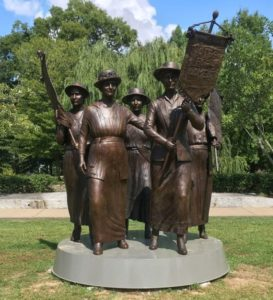“Women are now 55% of the population so think if all the women who could vote, did vote, we could really make a difference.”
And so begins our inaugural Squeeze the Day podcast … introducing Yvonne Wood — a lifelong advocate for women’s equality.
Yvonne Wood has been an advocate for women’s equality her whole professional life. As a founding member and former chair of the Tennessee Economic Council on Women, she has served on every major Nashville board or council related to women’s leadership, building opportunities for women in business and in life. Her advocacy culminated this past year as she served as President of the Tennessee Woman Suffrage Monument board. Her business acumen and connections helped pave the way for the formal dedication of the Tennessee Women’s Suffrage monument held in Centennial Park on Tuesday, Aug. 18, 2020. The monument stands as a testament to the 100th anniversary of women’s right to vote and holds a special place here in Tennessee as the state was the 36th and final state to ratify the amendment. Years of work forging women’s equality culminated in this beautiful monument designed by Nashville-based artist Alan LeQuire.
In this podcast, FiftyForward Communications Director Susan Sizemore, chats with Yvonne Wood about the planning for the 100th anniversary of women’s right to vote and the events tied to the celebration. Wood also shares her thoughts on what voting looks like today for the more than 63% of women who are eligible to vote this year.
Yvonne’s major success, as she describes it, was to plan the dedication for the Tennessee Women’s Suffrage monument. In the events leading up to the dedication, of course, was the fundraising for the monument and the artistic vision for it.
 Q: Tell us about the Women’s Suffrage Monument. What was your vision, when did your efforts begin and who are the women commemorated in that statue?
Q: Tell us about the Women’s Suffrage Monument. What was your vision, when did your efforts begin and who are the women commemorated in that statue?
YW: “When we traveled across the country and anytime suffrage came up, we noticed that Tennessee was never mentioned…We thought that was very odd and of course, being Tennesseans, we thought that was very sad. Tennessee’s pivotal role was never mentioned …”
“We wanted to bring honor to those suffragists who fought so hard for us to win the right to vote.”
The five women displayed in the Tennessee Women’s Suffrage Monument include Anne Dallas Dudley of Nashville, Frankie Pierce of Nashville, Abby Crawford Milton of Chattanooga, Sue Shelton White of Jackson and lastly, Carrie Chapman Catt, president of the National American Woman Suffrage Association.
Q: You lead the fundraising efforts for the Women’s Suffrage monument, located in Centennial Park near the Parthenon—how difficult was this process?
YW: “I don’t really like to ask people for money, but I have to say that if you ever want to be a fundraiser, you need to have a project that people want to be involved with …”
Wood then describes creating a society of women who want to donate, which then grew to a few hundred people who wanted to be involved including several corporate donors and from there, the project blossomed. They brought in artist Alan LeQuire who helped bring their vision to life.
Q: In a world where monuments are being challenged, how does this make you feel … especially to see women be celebrated for their role in history?
YW: “Some monuments are offensive to some groups especially in today’s world, but I wish we could find a way—instead of defiling them or tearing them down— they could be moved to places where they are not so offensive… With our own monument, we tried to be very diverse …”
In describing her upbringing, Wood shares experiences from her family-run grocery store in Gallatin that shaped her thinking about people and culture. The store’s customers came from all walks of life and she says working there was a “good training ground.” Her experiences during that time were the kind that “make us into the people we are.”
She describes her first voting experience – voting for John Kennedy in 1960 – and how her family emphasized the importance of voting. Her early career experiences illuminated many inequalities including pay inequity and racial injustice. These experiences led her to create the kind of working environments that were equitable for women.
Wood adds, “Men and women need to give serious thoughts to how important our voice in our government is and how much it means not only for us but for generations that follow us.”
To hear more about how Yvonne Wood’s passion for the Tennessee Women’s Suffrage Monument project inspired the journey to bring the vision to life, give a listen to our new podcast.


